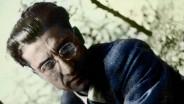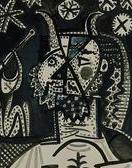 Un jour viendra où le jeune dieu sera un homme,
Un jour viendra où le jeune dieu sera un homme,
sans souffrance, avec le sourire mort
de l’homme qui a compris. Le soleil lui aussi glisse au loin,
en rougissant les plages. Un jour viendra où le dieu
ne saura plus où étaient les plages de jadis.
On s’éveille un matin : l’été est déjà mort,
dans les yeux grondent encore des splendeurs,
comme hier, et à l’oreille le fracas du soleil
devenu sang. Le monde a changé de couleur.
La montagne ne touche plus le ciel ; les nuages
ne s’amoncellent plus comme les fruits ; dans l’eau
pas un galet n’affleure. Un corps d’homme
se courbe pensif, où respirait un dieu.
C’est la fin du grand soleil d’été et de l’odeur de terre
et de la route libre, animée par un peuple
qui ignorait la mort. On ne meurt pas l’été.
Si quelqu’un venait à disparaître, il y avait le jeune dieu
qui vivait pour les autres et ignorait la mort.
Sur lui, la tristesse n’était que l’ombre d’un nuage.
Son pas étonnait la terre.
Maintenant,
la lassitude pèse sur les membres de cet homme,
sans souffrance : la calme lassitude d’une aube
ouvrant un jour de pluie. Les plages assombries
sur lesquelles jadis il n’avait qu’à poser son regard
ne connaissent plus le dieu. Et l’océan de l’air
ne revit plus au souffle. Les lèvres de l’homme
se plissent résignées, pour sourire devant la terre.
*
Mito
Verrà il giorno che il giovane dio sarà un uomo,
senza pena, col morto sorriso dell’uomo
che ha compreso. Anche il sole trascorre remoto
arrossando le spiagge. Verrà il giorno che il dio
non saprà più dov’erano le spiagge d’un tempo.
Ci si sveglia un mattino che è morta l’estate,
e negli occhi tumultuano ancora splendori
come ieri, e all’orecchio i fragori del sole
fatto sangue. È mutato il colore del mondo.
La montagna non tocca piú il cielo; le nubi
non s’ammassano piú come frutti; nell’acqua
non traspare più un ciottolo. Il corpo di un uomo
pensieroso si piega, dove un dio respirava.
Il gran sole è finito, e l’odore di terra,
e la libera strada, colorata di gente
che ignorava la morte. Non si muore d’estate.
Se qualcuno spariva, c’era il giovane dio
che viveva per tutti e ignorava la morte.
Su di lui la tristezza era un’ombra di nube.
Il suo passo stupiva la terra.
Ora pesa
la stanchezza su tutte le membra dell’uomo,
senza pena, la calma stanchezza dell’alba
che apre un giorno di pioggia. Le spiagge oscurate
non conoscono il giovane, che un tempo bastava
le guardasse. Né il mare dell’aria rivive
al respiro. Si piegano le labbra dell’uomo
rassegnate, a sorridere davanti alla terra.
*
Myth
The day will come when the young god will be a man,
without pain, with the man’s dead smile
which he has understood. Even the sun spends itself
remote, reddening the beaches. The day will come when the god
will no longer know where the beaches of the past are found.
One wakes up one morning when the summer is dead,
with still a splendour in the raging eyes
as yesterday, and in the ear the roar of the sun
made blood. The colour of the world has changed.
The mountain no longer touches the sky; the clouds
no longer amass like fruit; in water
no longer shining on a pebble. The body of a man
leans over thoughtfully, where a god breathed.
The sun is gone, and the smell of earth,
and the free street, colorful with people
who ignored death. You do not die in the summer.
If someone disappeared, there was the young god
who lived for everyone and ignored death.
On whom sadness was a shadow of cloud.
His pace amazed the earth.
Now fatigue
weighs on all the limbs of man,
without pain, the calm weariness of dawn
which opens a rainy day. The dark beaches
do not know the young man, when once
it was enough that he looked at them.
Nor does the sea of air live again
in the breath. The lips of the man are folded,
resigned, to smile in front of the earth.
***
Cesare Pavese (1908-1950) – Lavorare stanca (Einaudi, 1943) – Travailler fatigue
Découvert ici

